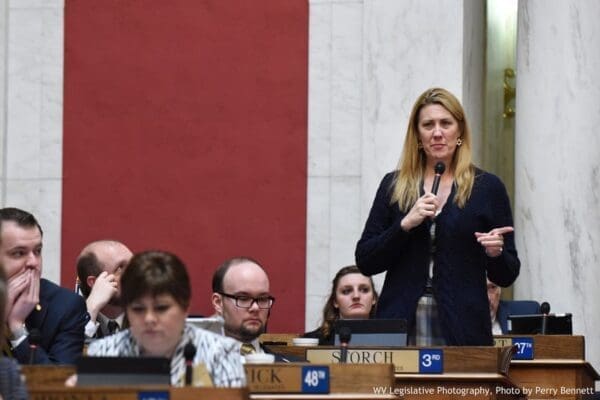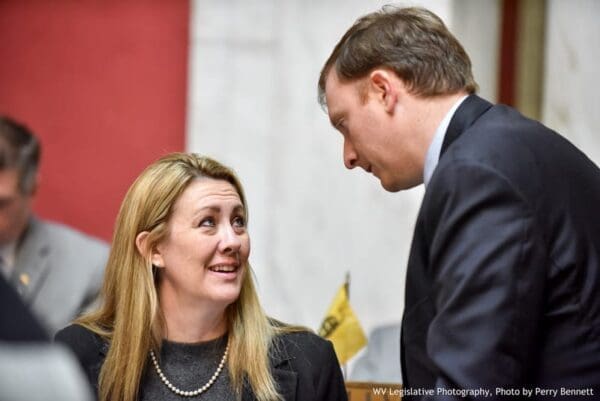It has never been about toeing the party line for Del. Erikka Storch, but instead it’s about the people in the House of Delegates’ third district and throughout the Northern Panhandle.
Since the COVID-19 pandemic began in March, more of her constituents in Ohio County have discovered that to be true because it was Storch who connected them to right person who receives unemployment benefits for clarifications on the restriction put into place by Gov. Jim Justice.
“I have done as much as I could possibly do for the residents who contacted me about their unemployment benefits, and I continue to help those people this week,” Storch said. “I continue to receive emails from constituents who are still having issues because they have lost employment because of the pandemic, and I don’t think anyone knows what to expect during the rest of this year.
“With everything considered, I think the people in Charleston have done a great job trying to get to all of the people who filed for unemployment, but in some cases it took some phone calls,” she continued. “Let’s face it; no one had experienced what took place when all of the shutdowns took place because of COVID-19. I’m not sure how many residents reached out to me, but once I got them connected to someone with Workforce West Virginia, they have had their issues resolved relatively quickly.”

Connected in Charleston
Storch serves as the chair of the Interstate Cooperation and Political Subdivision committees in the House, and she is a member of the Finance and Technology and Infrastructure committees, too, so the lawmaker does not have much time when in the state capital for the Legislature’s annual 60-day regular session.
That fact, though, has benefited the citizens of Ohio County, Storch believes.
“I feel like I have made some inroads for the people of my district and in the Northern Panhandle with the relationships I have developed in Charleston,” Storch said. “I have the ability to connect my constituents with the people in Charleston that they need to talk to for various reasons. It takes a little bit of time to take you seriously as a lawmaker when you are first elected, and now that my colleagues and others know my objectives, they do take me seriously.
“It’s like any other job in a lot of respects,” she said. “If you are respectful for those who have been there before you, and you are respectful to those involved in the legislative process, then that respect is returned. That’s why I have been able to develop those relationships for the good of the people up here.”
Storch works very well with De. Shawn Fluharty (D-3rd), the minority vice-chair of the House’s Judiciary Committee, and that relationship would continue as long as both lawmakers are re-elected on Nov. 3.
“It is easy to work with Shawn because he is member of the Legislature for the same reasons I am,” she explained. “We may be members of different parties, but most of the time we are on the same page because of what it means to the people here. Protecting greyhound racing the and 1,200 jobs that go with it is just one of many examples, and we worked together to make sure the House members knew the real facts in case the when issue came to our chamber.”

A Decade Later
It was in 2010 when Del. Storch was initially elected to the state’s House of Delegates, and she is positive the upcoming regular session will appear much different from any other during her legislative career. Gov. Justice refused to call a special session during the spiring and summer months, and the delegate does not expect the person who wins the gubernatorial race to summon the state’s 133 lawmakers before February for the regular session.
Even then, social distancing inside the House chamber will be challenging if that is where floor sessions will take place.
“I don’t think anyone right now knows how it is going to work because of COVID-19,” Storch said. “I know in the past a lot of people were mentioning the Charleston Arena, but I’m sure it will depend on the number of active cases in Kanawha County when we are scheduled to go down.”
If re-elected, the Third District delegate is certain there will be many new faces in the House because of retirements and lost elections, but her motivation will remain the same.
“You are one of a hundred delegates in the House, and I have never been the type of person who demands titles or anything like that. That’s not my style,” Storch explained. “When I am there in Charleston, it’s about the service, and I enjoy serving the voters, and I enjoy making life better in the state of West Virginia.
“I do believe we have done a very good job since the Republicans took over the majority in the House and the Senate, and I believe there’s a lot more work to do to get us to the point to where our economy will begin to grow and when our residents will consider staying in the state,” she said. “That’s the goal, and it’s not only about retention of our residents, but also about attracting new residents, too.”
Storch believes the approved phase-out processes involving the taxation of both Social Security and Veterans benefits are prime examples.
“Those two things make big differences for the people of West Virginia because of the amount of our citizens who have served the military, and also because we are an older state right now,” the lawmaker said. “Those two things are stepping stones because you don’t want to create huge deficits.
“There remains a lot more for us to do, too, and now that I have been on the Finance Committee for eight years, I’ve come to understand how it works. It’s big dollars, and it’s real money,” Storch added. “We usually have a lot of new delegates every two years, and sometimes they come down and think they are going to get rid of this and that, and that’s just how it works. Because of my experience, I know exactly how it works.”


